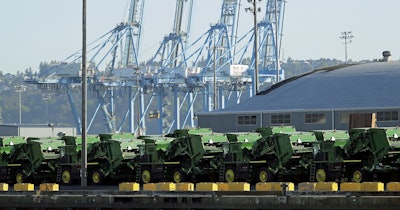
The White House's top economic adviser has acknowledged that U.S. consumers and businesses pay the tariffs that the Trump administration has imposed on billions of dollars of Chinese goods, even as President Trump himself insisted in a tweet, incorrectly, that China pays.
Chris Wallace, host of "Fox News Sunday," asked him, "It's U.S. businesses and U.S. consumers who pay, correct?"
"Yes, I don't disagree with that," said Larry Kudlow, the head of the president's National Economic Council.
Kudlow added, "Both sides will pay," but he stipulated that China "will suffer (economic) losses" from reduced exports to the U.S., not from paying the tariffs.
Kudlow's admission contradicts many of Trump's comments and tweets to the effect that Chinese companies pay the tariffs in what amounts, in the president's view, to a massive transfer of wealth to the United States from China. Yet almost no economist has agreed with Trump's view and fact-checkers routinely brand Trump's assertion false and point out that American importers of goods from China pay the tariffs.
Trump has also asserted that trade wars are "easy to win," but Kudlow accepted that they come with costs for the U.S. economy, though he downplayed the impact.
On Friday, the Trump administration raised duties on $200 billion of Chinese imports to 25% from 10%, after charging that China had backtracked on commitments it made earlier in the talks. The administration has already hit $50 billion of additional Chinese goods with 25% duties.
Later Sunday, Trump reiterated his view in a tweet: "We will be taking in Tens of Billions of Dollars in Tariffs from China. Buyers of product can make it themselves in the USA (ideal), or buy it from non-Tariffed countries."
Yet Carl Weinberg, chief international economist at High Frequency Economics, a forecasting firm, pointed out that many goods made in China aren't manufactured elsewhere. That's why many U.S. importers have little choice but to pay the tariff.
"So if you need that new iPad, it is you who will be paying the import duty, not some worker in China," Weinberg wrote in a research note.
Trump has also threatened to impose import taxes on the remaining $300 billion in Chinese imports, a step that Kudlow estimated would take several months to implement.
Imposing those tariffs would impact a wide range of consumer goods — clothes, shoes, toys, and electronics such as iPhones — that have been mostly exempted so far and could prompt steep cost increases that many Americans would likely notice.
Kudlow, however, said the economic impact of placing tariffs on all Chinese imports would be to cut economic growth 0.2 percentage points, "a very modest number."
Independent economists, though, think the impact would be larger. Gregory Daco, an economist at Oxford Economics, estimates it would reduce U.S. growth by a half percentage point and cost 300,000 jobs.
Kudlow also said the U.S. is awaiting retaliation from China over the increased tariffs, after talks in Washington ended on Friday without a deal.
"The expected countermeasures have not yet materialized. We may know more today or even this evening or tomorrow," he told "Fox News Sunday."
Both sides have indicated that future talks are likely. Kudlow said on Sunday that Chinese officials have invited U.S. Trade Representative Robert Lighthizer and Treasury Secretary Steven Mnuchin to visit Beijing, though nothing has been scheduled.
Kudlow also said that Trump and China's President, Xi Jingping, may meet in late June at the G-20 international conference in Japan.
On Saturday, Trump tweeted that he thought that "China felt they were being beaten so badly in the recent negotiation that they may as well wait around for the next election, 2020, to see if they could get lucky & have a Democrat win."
Beijing retaliated for previous tariff hikes by raising duties on $110 billion of American imports. And officials have targeted American companies operating in China by slowing customs clearance and stepping up regulatory scrutiny.
Sen. Rand Paul, R-Ky., told ABC's "This Week" that he advised the president to finalize a trade deal with China soon, "because the longer we're involved in a tariff battle or a trade war, the better chance there is that we could actually enter into a recession because of it."
The two countries are sparring over U.S. allegations that China steals technology and pressures American companies into handing over trade secrets, part of an aggressive campaign to turn Chinese companies into world leaders in robotics, electric cars and other advanced industries.


















